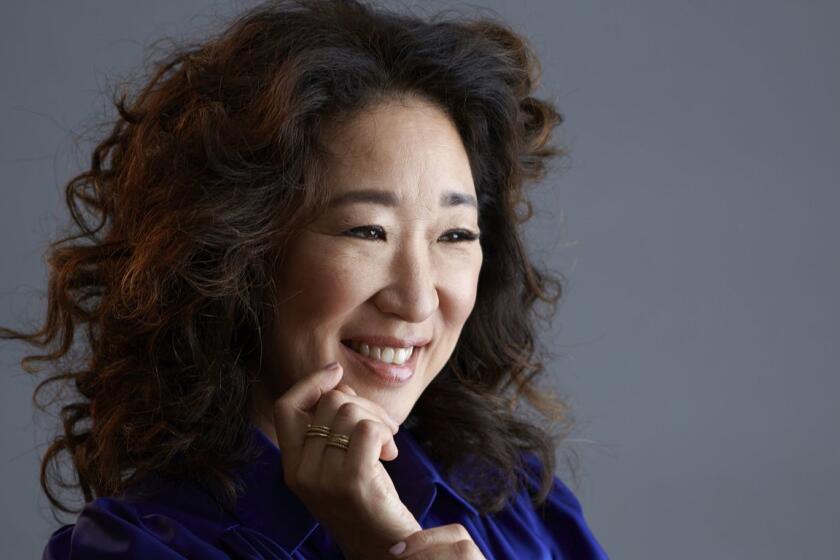Netflix’s new campus comedy is a mess. The marvelous Sandra Oh holds it together
- Share via
In “The Chair,” a new Netflix series created by actor Amanda Peet and Annie Julia Wyman, Sandra Oh plays Dr. Ji-Yoon Kim, newly installed head of the English department at Pembroke University, a small, lower-tier Ivy. (The locale is unstated in the show, but the show was filmed in Pittsburgh, and many scenes are flecked romantically with snow.) Even before Ji-Yoon, the first woman to occupy the position, brings a meeting to something like order, things are falling apart for her — including, literally, the desk chair in her new office.
The department is “hanging on by a thread”; Ji-Yoon is told by her dean (David Morse) to cut the deadwood from the faculty, pointing her toward professors with the “highest salaries and lowest enrollments,” which is to say, in youthspeak, the olds. “I feel like someone handed me a ticking time bomb because they wanted to make sure a woman was holding it when it explodes.”
Her other challenges are these:
Her friend, colleague and predecessor as department head Bill (Jay Duplass), who has himself been falling apart since the death of his wife a year earlier, goes off the rails immediately after his daughter leaves for (a different) college — drinking, urinating in public, missing class. This causes ceaseless distraction for Ji-Yoon just as she tries to get going in her new position. (Like Guy Pearce in “Mare of Easttown,” he has written a successful novel, and is not at work on another one; it’s pointed out to him that he is a cliche.)
The “Grey’s Anatomy” veteran says she’s not interested in reprising the role of Cristina Yang. But she still appreciates being asked about it.
Things get even more distracting when in the course of a class, Bill illustrates a definition of fascism with an offhand Nazi salute and a “Heil Hitler,” and social media being what it is, well, you can imagine. Oddly, this lecture, of which we see just enough before and after the Hitler salute to understand its context and that the outrage that follows is misplaced, is the only instance of teaching in the whole series that seems actually interesting; I was ready to hear more. But it is also, brief as it is, one of its few instances of teaching at all.
Ji-Yoon’s friend and colleague Yasmin, called “Yaz” (Nana Mensah), is up for tenure, and Ji-Yoon thinks that giving her the Distinguished Lectureship might be the shot of adrenaline the department needs to jump-start its heart. Why there is any drama around this is unclear — she’s a star, she’s young, she’s modern, her classes full of excited students who produce “Hamilton”-quality takes on “Moby-Dick,” she publishes, wins awards. And she’s a Black woman on a campus where students are clamoring for diversity. (Racial inequality is mentioned now and again — the faculty is 87% white, we’re told, and paintings of dead white men adorn the school walls — but how race might have affected Yaz’s career, or Ji-Yoon’s, is not demonstrated or discussed.) Yet drama there is.
Ji-Yoon’s adopted daughter, Ju-Hee, called “Ju Ju” (Everly Carganilla), whose Oaxacan heritage her mother is attempting to honor, is thinking a lot about death. Bill and Ju Ju have an enviably tight connection, so he’s always around.
And the olds, represented by Bob Balaban’s Elliot (specialty: Melville) and Holland Taylor’s Joan (specialty: Chaucer), don’t want to go, and Ji-Yoon doesn’t really want to make them go, though Peet (as showrunner) has stacked the cards against them. We get jokes about colonoscopies and adult diapers and not being able to work the copier (though that is a plot point, at least). “We’re still in our intellectual prime and have plenty to offer,” says one aged don, punctuating the statement with flatulence — adding insult to infirmity, so to speak. Of course, good and bad professors come in all ages, and the most innovative of them can be less effective than the most traditional; aged profs are frequently revered. But they are all failing here, boring the few students who come to their classes, unable to convince them of the relevance of the books they love — even Joan, an unsung pioneer we are to regard as a bit of a heroine.
Then there is the quasi-rom-com, with its linchpin child. It’s not that this aspect of the story is particularly logical, but we are used to thinking illogically about such things. Amor vincit omnia, as it reads over the gates to Notting Hill University.
Carganilla, who is 7, is terrifically natural, and nothing she is made to say, even though she can be a little strange, sounds false. (Interestingly, the only instance of the word “triggering” in the series is spoken not by a student, but about Ju Ju by a babysitter spooked by her lack of boundaries.) The mother-daughter relationship, with its yawning chasm, is touching, and perhaps the most interesting aspect of the show — it is the one storyline where culture really matters — and certainly the easiest to care about. Brief scenes of the two brushing their teeth together convey layers of feeling. But mother is always having to run off!
Julia Haart, who left the ultra-Orthodox community eight years ago, is the streamer’s newest reality star. She tells The Times how she got out.
Similarly, Duplass’ scenes with Carganilla allow the actor to relax for a minute into ordinariness. Indeed, Ju Ju is practically the only person around whom Bill can be relied on to act like a semblance of an adult. Apart from the episodes of vehicular slapstick they afford, his drunk, drugged and/or disorderly episodes are as trying for the viewer as they must be for the people in his life, while his romantic aspirations concerning Ji-Yoon — the two seem to have some sort of unrealized or partially realized or mutually imagined old business — come across as perhaps less cute and more pathological than they’re meant to. (They’re meant to seem at least a little pathological, I think.)
Bill’s scenes with Ju Ju, by contrast, remind us that he’s basically a good guy. (Not a Nazi!) There is a beautiful, quiet passage in which they leaf through her favorite book, Edward Steichen’s “The Family of Man,” as she points out pictures of mothers and babies. “It has naked pictures in it,” she warns Bill before they begin.
“The Chair” is entertaining in a knockabout way, if you don’t look too closely, and Oh is wonderful every minute she’s in it. But I found it frustratingly vague: We never learn exactly how Ji-Yoon has come to the job, by campaign or collegial acclaim, or what it was like when Bill was running it, or how he so quickly stops mourning his wife and mooning over Ji-Yoon. And it is often at odds with itself. Its attempt to mix romantic comedy of a sort with an issue-oriented workplace satire — analogous to any institution, including the ones that make TV shows and newspapers, where questions of diversity and representation, empty promises and actual change, are being raised — is ambitious, but not well-integrated.
I don’t doubt there are real-world examples for every bureaucratic dysfunction and indignity, every territorial dispute and political expediency pictured here, and yet as presented, the series feels schematic, too declarative, a little bit dutiful, as if boxes were being ticked. It may just be that, with its attention focused in so many places, it is as distracted as Ji-Yoon, trying to keep everyone happy and satisfying no one. Its attempt to honor multiple points of view, especially surrounding l’affaire Bill, feels more indecisive than incisive, more contradictory than complex. “What is this actually about?” you may wonder.
If nothing else, the series demonstrates, if anyone still needs that demonstrated, that Oh is a marvelous actress, with an all-encompassing range. There is real feeling in her comedy, and however much a scene or speech requires her to service the plot or make a point, she is a wholly present, whole person in all of them. Her performance holds the show together through passages that make less than perfect sense.
There are lots of nice performances here, not just from the stars. Havana Rose Liu as a young administrator Joan goes to with a complaint when her office is moved into a basement under the gym, and Mallory Low as Bill’s teaching assistant, hit the right notes of official and personal concern, respectively. Ji Yong Lee as Ji-Yoon’s father and Ju Ju’s grumbling yet devoted babysitter is dryly funny and gives Oh the opportunity to speak a little Korean. Late in the series there is a more-than-cameo appearance by David Duchovny as himself, demonstrating once again that nobody lampoons Duchovny like Duchovny (see his “Larry Sanders” episodes) and reminding the world that he is actually a bestselling and well-reviewed author with degrees from Princeton and Yale. He has one of the series’ funnier lines, as well: “I don’t see color, or ethnicity, or even faces at this point.”
The victories aren’t all exactly the ones you might expect, but this is a comedy, and there are victories.
‘The Chair’
Where: Netflix
When: Any time, starting Friday
More to Read
The complete guide to home viewing
Get Screen Gab for everything about the TV shows and streaming movies everyone’s talking about.
You may occasionally receive promotional content from the Los Angeles Times.









